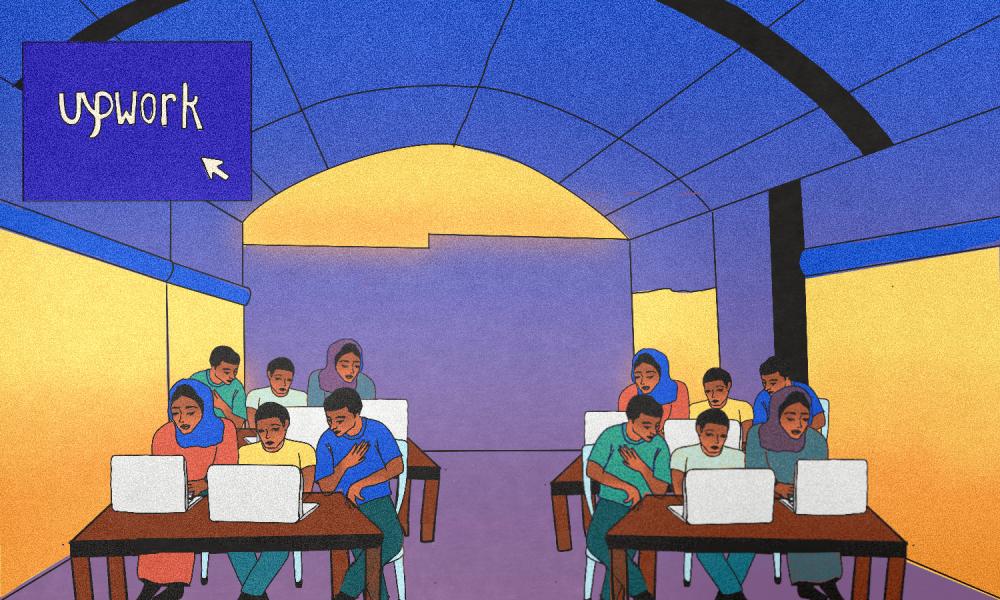Connecting with Farida Algoul in Gaza is challenging due to the unreliable internet and telecommunications infrastructure that has deteriorated under ongoing conflict. As an English teacher and freelancer, Algoul spends her time between a makeshift classroom in a tent, where she offers free lessons, and a provisional co-working space in Deir Al-Balah. Here, she and about 50 other displaced freelancers compete for scarce internet access while completing assignments through Upwork, a freelance marketplace. Despite her efforts, Algoul earns a modest $200 monthly, significantly reduced by platform fees and currency exchange costs. The ongoing conflict has exacerbated the economic situation in Gaza, forcing individuals like Algoul to seek freelance work online, which the UN estimates to be the only option for at least 12,000 workers.
The blockade and military actions have severely restricted jobs in Gaza, with the International Labor Organization reporting a near-total loss of employment following the bombardment that began on October 7, 2023. Even fundamental resources such as a strong internet connection and reliable electricity are hard to come by, further compounding the challenges faced by freelancers. Algoul described a constant atmosphere of devastation and fear, underscoring the unique vulnerabilities they experience in the region, including threats from airstrikes. The reality of working in such an environment is precarious; she readily admits the fear of not knowing if she or her students will remain safe at any moment.
Waleed Iky, another freelancer, shares similar struggles. He graduated just before the onset of the conflict and initially focused on survival amid the destruction in Gaza. As he transitioned back to work, he discovered that informing potential clients about his location sometimes risked his opportunities, reinforcing the stigma of being a freelancer from Gaza. Iky’s experience demonstrates a stark dichotomy; while he seeks to advertise his skills in marketing, potential clients across the globe are often unaware of the severe circumstances remote workers face, leading to inflexible deadlines and undue pressure on freelancers.
Despite significant challenges, Iky has resumed his marketing business using the co-working facilities provided by Hope Hub, where he works under constant threat from bombings. The complexities of working in such a setting mean that electrical power is carefully managed and earned income is difficult to access, given the destruction of banking infrastructure and exorbitant fees. The struggle for basic utilities significantly hampers freelancers’ ability to function professionally and respectfully, wherein Iky relies on intermittent external charging opportunities to extend his work hours when power cuts out.
Hope Hub emerged from these harsh realities, founded by Salah Ahmad, a displaced entrepreneur wishing to provide a functional workspace for freelancers and students amidst the chaos of war. Initially starting in a tent with just five people, Hope Hub has grown to multiple locations despite continuous threats and the destruction of their environments. The organization has become essential in providing high-speed internet and electricity, although conditions remain challenging. Ahmad expressed a fundamental belief in the necessity of remaining productive and engaged, even as they navigate logistics in a war zone, highlighting a persistent human need to maintain routine and purpose.
Students in Gaza, like Othman Shbier and Aya Esam, face their own set of challenges in continuing their education amidst the conflict. Shbier travels two hours daily to access online classes and hopes to graduate into a job market riddled with obstacles. Esam, a final-year dental student, cannot complete her training in a safe environment and shares the sentiment that furthering education is a fundamental right and dream. Many students find their aspirations stifled by the daily threats of violence and uncertainty, as they struggle to find meaningful opportunities for employment in the future. Yet, individuals like Algoul remain committed to fostering resilience among the youth, acting as beacons of hope during the darkest of times.

